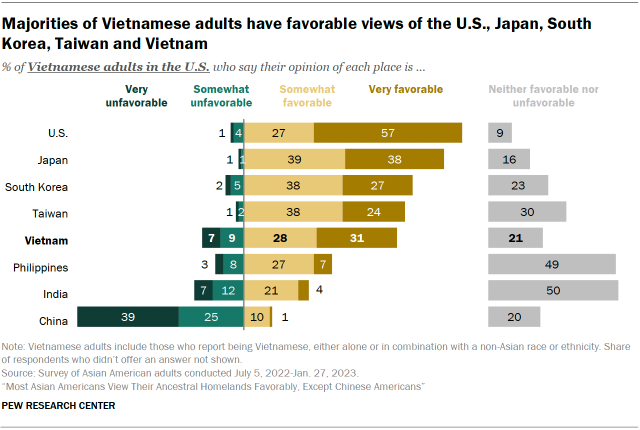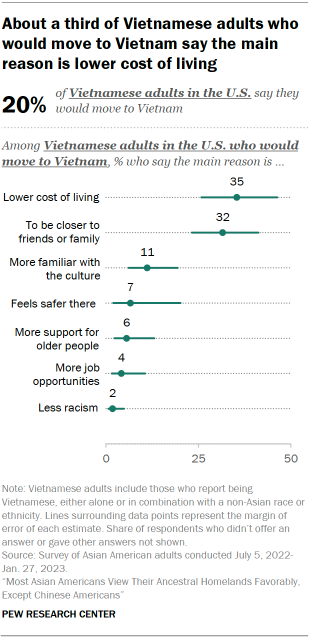CORRECTION (July 19, 2023): A previous version of this report misstated which places in Asia Vietnamese American adults are more likely to have a favorable view of than Vietnam. The text has been updated to reflect that Vietnamese adults are more likely to have a favorable view of Japan than Vietnam.
A higher share of Vietnamese Americans view the United States favorably than any other place asked about in our survey. Some 84% of Vietnamese adults say they have a favorable view, including 57% who say their opinion of the U.S. is very favorable. Only 6% of Vietnamese Americans have an unfavorable view of the country.
A majority of Vietnamese adults have favorable views of Japan, South Korea and Taiwan.
When it comes to Vietnamese Americans’ views of Vietnam, about six-in-ten say they have a favorable opinion. Similar shares say their opinion of Vietnam is neutral or unfavorable (21% and 16%).

“[My children] have more opportunities to develop than we did when we were in Vietnam. They have opportunities to learn, and their study is better…. [M]y generation grew up after April 30, 1975 [the fall of Saigon], and there were a lot of obstacles. Schools were far away. I had to walk 4 kilometers (2.5 miles) to my middle school back then. Here, the school buses take them to school and drive them home.”
– Immigrant man of Vietnamese origin, age 49 (translated from Vietnamese)
Though a majority of Vietnamese adults have a positive impression of Vietnam, their view of the homeland of their ancestors is more moderate than some other Asian origin groups. Japanese and Korean adults view the place they trace their heritage to more positively than any other Asian location asked about. However, Vietnamese adults are more likely to say that they have a favorable view of Japan than they do of Vietnam.
Vietnamese women are more likely than Vietnamese men to view the country in a positive light. Two-thirds of women say their view of Vietnam is very or somewhat favorable, compared with about half of Vietnamese men. Vietnamese adults younger than 50 and those born in the U.S. also have particularly positive views of Vietnam (72% and 70%).
Vietnamese Americans’ opinions of India and the Philippines are more neutral. About half say they see both countries neither favorably nor unfavorably (50% and 49%, respectively). In the case of India, the balance of opinion is somewhat divided between positive (25%) and negative (19%) views. Views of the Philippines skew generally more positive, however, with 34% saying they have a favorable view of the country and 11% saying they have an unfavorable view.
Vietnamese Americans have negative views China. About two-thirds of Vietnamese adults (64%) have an unfavorable view of China, including 39% who say they see it very unfavorably.
Vietnamese Americans’ views vary by partisan identity
When it comes to views of the U.S. and Vietnam, views vary across political party affiliation. Nearly all Vietnamese adults who are Republicans or lean to the GOP (95%) have a favorable opinion of the U.S., including 74% who view the country very favorably. In comparison, fewer Vietnamese Democrats or Democratic leaners (71%) say their opinion of the U.S. is favorable.
“[My parents] said Vietnam is way different from when they left it, but I guess they did leave during the [Vietnam] war so it would really be different. But they said we’re a lot more privileged [where we live in the U.S. now] at least, especially where I grew up where it’s mostly Vietnamese. They said the food’s actually better here because we have more access to better resources and produce. They said they wouldn’t move back but they just want to take me and my older brother just to see it.”
– U.S.-born woman of Vietnamese origin, age 22
This pattern is reversed on favorability toward Vietnam. Though similar shares say they have a favorable opinion of the country, Vietnamese Republicans are more likely than Vietnamese Democrats to have an unfavorable opinion (24% vs. 8%).
In general, Vietnamese registered voters are more likely to identify as Republicans or lean to the GOP than Asian American registered voters overall.
A large majority of Vietnamese Americans say they would not move to Vietnam given the chance

When asked if they would ever move to Vietnam, most Vietnamese Americans (78%) say no. Foreign-born Vietnamese adults are slightly more likely to say they would move (21%) than those born in the United States (14%).
Among those who say they would be willing to move to Vietnam, the main reasons named are lower cost of living (35%) or to be closer to friends or family (32%). Smaller shares of Vietnamese adults also point to more familiarity with Vietnamese culture (11%), feeling safer in Vietnam (6%) or more support for older people (4%) as the primary reason they would be interested in moving there.
“I think over there [in Vietnam] it’s a lot easier to socialize. You can just walk out and go wherever in crowded areas and just kind of walk around but I think the opportunities here [in the U.S.] is a lot more than over there in Vietnam.”
– U.S.-born man of Vietnamese origin, age 40




